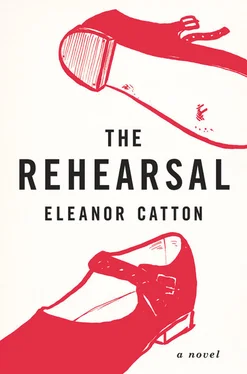“Before we begin fighting I want to start with a few exercises that will get us comfortable with touching each other,” the Head of Movement said. “This exercise is called The Raft of the Medusa. The aim of the exercise is to be the last person standing inside this rectangle. When I say you may begin, you must all start pushing each other. If any part of your body touches the floor outside the rectangle, you must leave the raft immediately. The last person to remain inside wins. Does everybody understand?”
There was a flurry of nodding from inside the cramped rectangle.
“Pushing only,” the Head of Movement said. “No punching. No kicking. Not yet.”
Everybody tensed their elbows and braced their legs, ready to fight. The students on the outer edge realized too late their disadvantage, and all at once they tried to angle themselves better to worm their way into the center.
“All right,” the Head of Movement said. “Go.”
The rectangular crowd immediately began to boil. A few of the students were shoved out of the rectangle within seconds; they skipped backward and retreated with a kind of rueful disappointment to watch. Stanley found himself surrounded by girls, and at first he shoved at them gingerly, careful with his hands lest he touch their breasts by accident, using mostly his shoulders and his hips. The girls were less polite. Little palms were shoving at the small of his back all of a sudden, pushing and pushing, and he found his feet slipping on the floor. He grabbed a fistful of somebody’s sweater in an effort to resist. The whole crowd lurched suddenly sideways; everybody’s bare feet arched and skidding over the floorboards, and half the class tumbled over the western chalked perimeter and off the raft. The disqualified students hopped neatly out of the way and left the rest of the group to fight.
With a large part of the class gone, the winning students could move more freely. The game became more tactical and more deliberately hostile. Stanley had one of the smaller girls in a clumsy underarm headlock and was trying to force her over the line when another student fell sideways on to him and sent all three of them staggering off the raft. The Head of Movement was standing calmly to the side. He checked his watch.
When the raft had been emptied of most of the students, the remainder formed a ring around the final fighters and began to chant and cheer. The winning three were locked in a sweaty embrace in the chalky center of the raft, skidding sideways and occasionally dropping painfully on to a knee or a hip and tugging the others down as they fell. Their legs were braced and bowed as they grappled with each other, two boys and a girl—a wiry muscular girl with the shapely and decided figure of a dancer.
Somebody on the perimeter set up a stamping rhythm, and soon all the students were stamping and stamping, their bare feet sending up tiny clouds of white dust, the steady beat filling the massive space, rising up to the lofty stippled ceiling where the hooded bulbs hung from their bluish rack unlit. The Head of Movement did not join in the stamping, but his long fingers tapped in time against his forearm and his eyes moved carefully from the ring of cheering watchers to the fighting three, and back again. Every time one of the winning fighters was shoved hard or forced closer to the chalk perimeter there was a whoop of appreciation from the crowd and an explosion of clapping and laughter. The beat got faster and faster. The Head of Movement nodded his head and sometimes smiled a tiny smile.
In a sudden fluent movement the dynamic of the struggling three abruptly changed, the boys turning upon the girl and moving to work in tandem for the first time. The tacit flare of cooperation made the Head of Movement inhale gravely and stroke the corners of his mouth with his finger and his thumb. The girl was finally ousted, hauled over the line by the boys shoving at her in a parallel surge. The boys then turned to face each other, skipping quickly away from the perimeter and back into the safety of the middle of the raft. The girl added her voice to the cheering and the stamping, and the boys were once again locked in a skidding headlock, a weary inching dance that finally ended when the two of them fell across the southern line in a tangled heap.
The first-years performed The Raft of the Medusa six times, repeating the exercise again and again until the students were flushed and sore and strained. As the morning wore on, their posture gradually began to change, hardening and drawing upward and becoming more aggressive and finally losing the curving self-conscious protectiveness that in the beginning had handicapped them all so plainly. The chalked line soon bled out into sticky tracks of gray and white, tearing outward like a dying star.
“Thank you,” the Head of Movement said after almost an hour, when the red-faced victor had sent his opponent lurching over the line for the sixth and final time. “Now you should all be nicely limbered up and you should have gotten used to touching each other. I want to start with the very basics of stage fighting and build upward.” He gestured for them to gather round. He said, “We’ll start with learning how to punch.”
May
The boy in the mask said, “I need a volunteer.”
The mask was cut away around his mouth like a jowl, curving over his upper lip so his chin and his lower teeth were exposed. The hard plastic curve around his mouth made him look a little like a marionette, shiny and rigid and hinged. The surface of the mask was smooth and flesh colored, with almond-shaped eye-holes, and attached to the boy’s face without elastic.
Several of the first-years in the audience raised their hands, grinning in a self-conscious, defensive way, and the masked boy pointed at one of them. “You,” he said, and beckoned. This was evidently a sound cue: the gymnasium was suddenly filled with the sound of a classic accordion, jolly and scissoring and gay.
The gymnasium door opened and the secretary darted in, trotting over to the Head of Acting and whispering urgently in his ear. The Head of Acting nodded, rose, and followed her out. The door closed behind them.
In the audience Stanley shivered with unknowing delight. He watched the volunteer make his way through the audience and mount the stairs to the stage. By now other masked figures were drifting coolly on to the stage from the wings, pacing about and looking impassively out at the audience through the fleshy almond holes in their cutaway masks.
“This is an exercise in the Theater of Cruelty,” the masked boy called out above the rising sound of the music. “This exercise is a challenge.”
He moved behind his volunteer. The boy stood and smiled uncertainly at them all, waiting for his instructions, listening for sounds of the masked boy’s movement behind him, and rocking back and forth self-consciously on his heels. Then the masked boy knocked him to the ground. As he fell forward on to his knees, the boy’s head was flung painfully backward, his expression hurt and bewildered by the split-second impact but still half-smiling his nervous defensive smile. Swiftly the masked boy darted forward and hit him again, and the boy fell flat on to his stomach, jarring his chin on the floor. In an instant the masked boy was kneeling on his back, pinning him flat on the ground and twisting the boy’s wrists around behind his back so he couldn’t move.
Somebody ran forward with a water-trough, a wide, flat basin filled with slopping water, and shoved it roughly down onto the floor. The attacker grabbed a fistful of his volunteer’s hair, reared up, and plunged him headfirst into the water. He held his own breath as he struggled to keep the volunteer’s head submerged, looking at his writhing victim down the length of his stiff veined arms and pinching his lips together in concentration. The victim began to thrash out in desperation and fear, his legs kicking out on the floorboards, panicked and flopping like a bloody gutted fish dying on the edge of a pier.
Читать дальше












